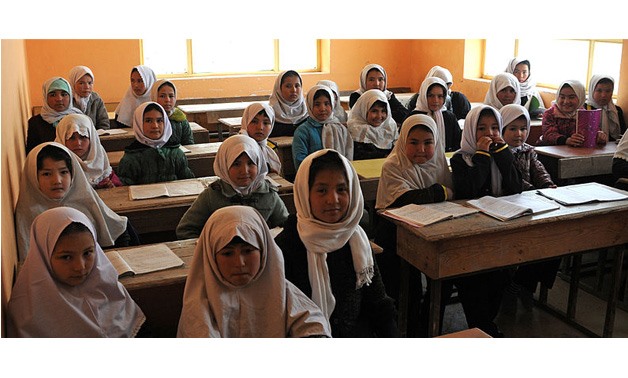
Young Afghan girls inside a classroom - Creative Commons via Wikimedia
CAIRO – 10 July 2017: A robotics team of six Afghan girls were banned by the U.S. government to attend the annual robotics competition held by FIRST Global organization in Washington DC from July 16-18. The competition aims to encourage learning in science, technology, engineering and mathematics around the world. It invites one team from each country as a means to build bridges across the world.
A group of Afghan girls based in the U.S. will represent the banned team during the competition, while the six girls will watch their ball-sorting robot compete in Washington DC via a video link from their hometown of Herat, in western Afghanistan, according to the FIRST Global contest organizers.
The Afghan team is not alone, as the Gambia team’s five teenage students were also denied visas. The students were not given a reason for the visa denials, according to ABC News.
14-year-old Fatemah Qaderyan, who made two journeys to the U.S. Embassy in the Afghan capital Kabul to apply for their papers said to Reuters, “We still don't know the reason why we were not granted visas, because other countries participating in the competition have been given visas."
Another team member, 17-year-old Lida Azizi, said, "All of the countries can participate in the competitions, but we can't. So it's a clear insult for the people of Afghanistan."
The Afghanistan team made a statement on the competition website that read, “We want to make a difference, and most breakthroughs in science, technology, and other industries normally start with the dream of a child to do something great.”
Reuters also reported that when the U.S. State Department spokesperson was asked on Tuesday why the girls were banned, he cited regulations prohibiting the agency from discussing individual visa cases.
From his side, the FIRST Global president, Joe Sestak, said in a post on the organization's Facebook page that he was "saddened" by the U.S. decision, but that the Afghan team would be able to connect with the competition via a live Skype video link. "That is how we must now honor our fellow teammates, those brave girls from Afghanistan," he said.
Sestak added that the teams of 156 countries had received their visas, including from Iran and Sudan, which are on Trump’s list of countries whose citizens are banned from entry.
"For Gambia, I feel just as saddened. We started this effort in Africa," Sestak said, adding that his organization hopes to hold the competition in various countries in the future to encourage wider attendance. Sestak also explained that Afghanistan has had a U.S. visa refusal rate of 75 percent, and Gambia 70 percent.
Human Rights Watch (HRW) also commented on the ban, saying, “the robotics team, struggling to call in to Washington DC via Skype on a lousy internet connection, in the middle of the night, is all too emblematic of the hollowness of U.S. efforts to empower girls in Afghanistan.”
The organization added, “the Trump administration is formulating a new Afghanistan strategy, but the talk is all about troop numbers, not school books – and certainly not girls. The number of girls attending school in parts of the country is falling due to rising insecurity and poverty, and declining donor support. The Taliban’s grip on the country is growing, and their desire to deny girls education largely unchanged.” It also stated, “This context makes the achievements of the robotics team exceptional. The team members are in their teens, an age when many Afghan girls leave school because of child marriage, child labor, lack of secondary schools for girls, and social barriers. Sixty-six percent of girls ages 12 to 15 are out of school. In a country where only 37 percent of adolescent girls and 19 percent of adult women are literate, donor countries should be sweeping these girls up to see how their achievement can be replicated – not slamming the door in their faces,” according to HRW’s official website.
In January, President Trump issued an executive order banning travel to the U.S. from six Muslim-majority countries, but Afghanistan was not included on the list. In a June 26 ruling, the U.S. Supreme Court revived parts of Trump's executive order that had been blocked by lower courts. The highest court let the ban go forward with a limited scope, saying that it cannot apply to anyone with a credible ‘Bona Fide’ relationship with a U.S. person or entity.
In 2001, the U.S. backed military intervention in Afghanistan toppled the Taliban regime that banned girls from school, women from working outside the home and all females from leaving home without a male relative. After 15 years, despite the U.S. and allied international troops’ support to the elected government in Kabul that constitutionally guarantees women's rights, the Taliban is regaining control over the country by holding some 40 percent of the territory.

Comments
Leave a Comment